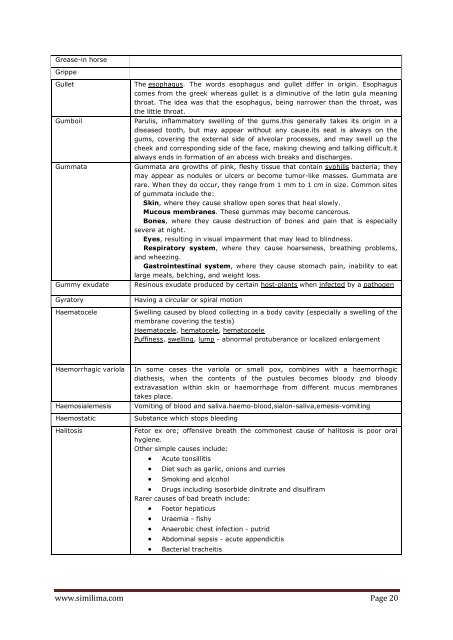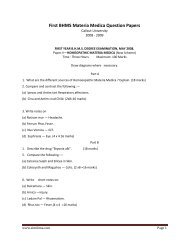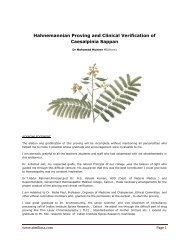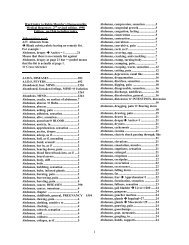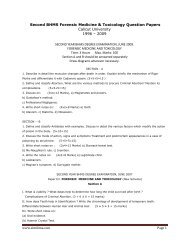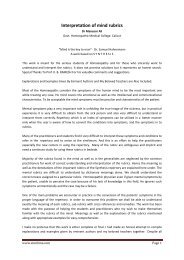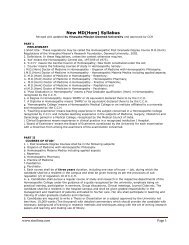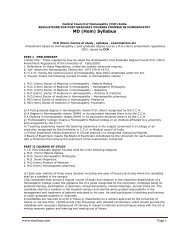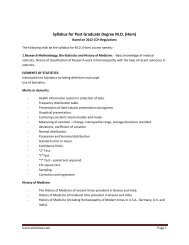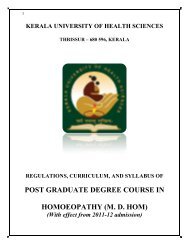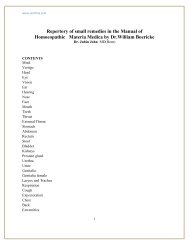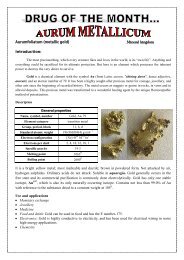Denotations & Old terminologies used in Homopathy - Similima
Denotations & Old terminologies used in Homopathy - Similima
Denotations & Old terminologies used in Homopathy - Similima
You also want an ePaper? Increase the reach of your titles
YUMPU automatically turns print PDFs into web optimized ePapers that Google loves.
Grease-<strong>in</strong> horse<br />
Grippe<br />
Gullet The esophagus. The words esophagus and gullet differ <strong>in</strong> orig<strong>in</strong>. Esophagus<br />
comes from the greek whereas gullet is a dim<strong>in</strong>utive of the lat<strong>in</strong> gula mean<strong>in</strong>g<br />
throat. The idea was that the esophagus, be<strong>in</strong>g narrower than the throat, was<br />
the little throat.<br />
Gumboil Parulis, <strong>in</strong>flammatory swell<strong>in</strong>g of the gums.this generally takes its orig<strong>in</strong> <strong>in</strong> a<br />
diseased tooth, but may appear without any cause.its seat is always on the<br />
gums, cover<strong>in</strong>g the external side of alveolar processes, and may swell up the<br />
cheek and correspond<strong>in</strong>g side of the face, mak<strong>in</strong>g chew<strong>in</strong>g and talk<strong>in</strong>g difficult.it<br />
always ends <strong>in</strong> formation of an abcess wich breaks and discharges.<br />
Gummata Gummata are growths of p<strong>in</strong>k, fleshy tissue that conta<strong>in</strong> syphilis bacteria; they<br />
may appear as nodules or ulcers or become tumor-like masses. Gummata are<br />
rare. When they do occur, they range from 1 mm to 1 cm <strong>in</strong> size. Common sites<br />
of gummata <strong>in</strong>clude the:<br />
· Sk<strong>in</strong>, where they cause shallow open sores that heal slowly.<br />
· Mucous membranes. These gummas may become cancerous.<br />
· Bones, where they cause destruction of bones and pa<strong>in</strong> that is especially<br />
severe at night.<br />
· Eyes, result<strong>in</strong>g <strong>in</strong> visual impairment that may lead to bl<strong>in</strong>dness.<br />
· Respiratory system, where they cause hoarseness, breath<strong>in</strong>g problems,<br />
and wheez<strong>in</strong>g.<br />
· Gastro<strong>in</strong>test<strong>in</strong>al system, where they cause stomach pa<strong>in</strong>, <strong>in</strong>ability to eat<br />
large meals, belch<strong>in</strong>g, and weight loss.<br />
Gummy exudate Res<strong>in</strong>ous exudate produced by certa<strong>in</strong> host-plants when <strong>in</strong>fected by a pathogen<br />
Gyratory Hav<strong>in</strong>g a circular or spiral motion<br />
Haematocele Swell<strong>in</strong>g ca<strong>used</strong> by blood collect<strong>in</strong>g <strong>in</strong> a body cavity (especially a swell<strong>in</strong>g of the<br />
membrane cover<strong>in</strong>g the testis)<br />
Haematocele, hematocele, hematocoele<br />
Puff<strong>in</strong>ess, swell<strong>in</strong>g, lump - abnormal protuberance or localized enlargement<br />
Haemorrhagic variola In some cases the variola or small pox, comb<strong>in</strong>es with a haemorrhagic<br />
diathesis, when the contents of the pustules becomes bloody znd bloody<br />
extravasation with<strong>in</strong> sk<strong>in</strong> or haemorrhage from different mucus membranes<br />
takes place.<br />
Haemosialemesis Vomit<strong>in</strong>g of blood and saliva.haemo-blood,sialon-saliva,emesis-vomit<strong>in</strong>g<br />
Haemostatic Substance which stops bleed<strong>in</strong>g<br />
Halitosis Fetor ex ore; offensive breath the commonest cause of halitosis is poor oral<br />
hygiene.<br />
Other simple causes <strong>in</strong>clude:<br />
Acute tonsillitis<br />
Diet such as garlic, onions and curries<br />
Smok<strong>in</strong>g and alcohol<br />
Drugs <strong>in</strong>clud<strong>in</strong>g isosorbide d<strong>in</strong>itrate and disulfiram<br />
Rarer causes of bad breath <strong>in</strong>clude:<br />
Foetor hepaticus<br />
Uraemia - fishy<br />
Anaerobic chest <strong>in</strong>fection - putrid<br />
Abdom<strong>in</strong>al sepsis - acute appendicitis<br />
Bacterial tracheitis<br />
www.similima.com Page 20


